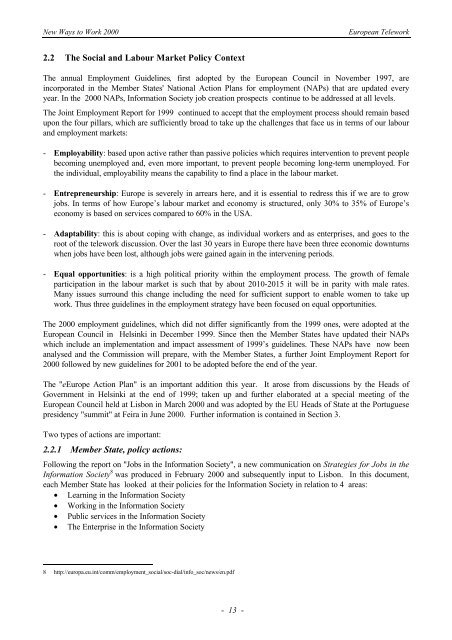eWORK 2000 - European Telework Week
eWORK 2000 - European Telework Week
eWORK 2000 - European Telework Week
- No tags were found...
Create successful ePaper yourself
Turn your PDF publications into a flip-book with our unique Google optimized e-Paper software.
New Ways to Work <strong>2000</strong><strong>European</strong> <strong>Telework</strong>2.2 The Social and Labour Market Policy ContextThe annual Employment Guidelines, first adopted by the <strong>European</strong> Council in November 1997, areincorporated in the Member States' National Action Plans for employment (NAPs) that are updated everyyear. In the <strong>2000</strong> NAPs, Information Society job creation prospects continue to be addressed at all levels.The Joint Employment Report for 1999 continued to accept that the employment process should remain basedupon the four pillars, which are sufficiently broad to take up the challenges that face us in terms of our labourand employment markets:- Employability: based upon active rather than passive policies which requires intervention to prevent peoplebecoming unemployed and, even more important, to prevent people becoming long-term unemployed. Forthe individual, employability means the capability to find a place in the labour market.- Entrepreneurship: Europe is severely in arrears here, and it is essential to redress this if we are to growjobs. In terms of how Europe’s labour market and economy is structured, only 30% to 35% of Europe’seconomy is based on services compared to 60% in the USA.- Adaptability: this is about coping with change, as individual workers and as enterprises, and goes to theroot of the telework discussion. Over the last 30 years in Europe there have been three economic downturnswhen jobs have been lost, although jobs were gained again in the intervening periods.- Equal opportunities: is a high political priority within the employment process. The growth of femaleparticipation in the labour market is such that by about 2010-2015 it will be in parity with male rates.Many issues surround this change including the need for sufficient support to enable women to take upwork. Thus three guidelines in the employment strategy have been focused on equal opportunities.The <strong>2000</strong> employment guidelines, which did not differ significantly from the 1999 ones, were adopted at the<strong>European</strong> Council in Helsinki in December 1999. Since then the Member States have updated their NAPswhich include an implementation and impact assessment of 1999’s guidelines. These NAPs have now beenanalysed and the Commission will prepare, with the Member States, a further Joint Employment Report for<strong>2000</strong> followed by new guidelines for 2001 to be adopted before the end of the year.The "eEurope Action Plan" is an important addition this year. It arose from discussions by the Heads ofGovernment in Helsinki at the end of 1999; taken up and further elaborated at a special meeting of the<strong>European</strong> Council held at Lisbon in March <strong>2000</strong> and was adopted by the EU Heads of State at the Portuguesepresidency "summit" at Feira in June <strong>2000</strong>. Further information is contained in Section 3.Two types of actions are important:2.2.1 Member State, policy actions:Following the report on "Jobs in the Information Society", a new communication on Strategies for Jobs in theInformation Society 8 was produced in February <strong>2000</strong> and subsequently input to Lisbon. In this document,each Member State has looked at their policies for the Information Society in relation to 4 areas:• Learning in the Information Society• Working in the Information Society• Public services in the Information Society• The Enterprise in the Information Society8 http://europa.eu.int/comm/employment_social/soc-dial/info_soc/news/en.pdf- 13 -








